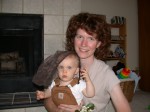This is the first of what we hope will become a regular column featuring humor, personal experiences, and reminiscences about life as an LTER researcher.
Being a mother and conducting field research at a remote site have a lot in common. Many summers at the Arctic LTER helped me develop relevant skills that I put to use every day with my three children. But it was Marilyn Walker who inspired me to have children more than a decade ago as she taught me about arctic botany while serving homemade cloudberry cobbler to her 5-year-old son, me, and her students at Toolik Field Station. Here are some of the lessons I learned.
- Acceptance of tedium is crucial in both arenas. In the midst of tedious and exhausting field work, you lose track of the whole purpose of the exercise, especially during dismal weather. How many more plots are left to sample before dark (which, conveniently, doesn't happen for much of the arctic summer)? How many times will my 2-year-old ask to hear the "Elmo Song"? Why do these children not understand what bedtime means? Some level of acceptance is needed for sanity.
- Flexibility is essential. If you're trying to measure photosynthetic rates and the sun hasn't come out for six days, you need to make good use of that newly freed up time, especially when you're at a remote site. Similarly, when you have prepared for a full day at work and your son's school calls because he is coughing like he has tuberculosis or just threw up all over his shoes, you have to be flexible as well. Think on the fly, and always have a backup plan.
- Prepare for every contingency. There is no way to really prepare to have children. But once a child has arrived, preparation becomes a crucial key to sanity and success, just like with field work. At Toolik, when something breaks or goes missing, you have to press on, no matter how much you might like to throw in the towel; so you plan and prepare for as many contingencies as possible. This is quite similar to preparing a diaper bag to go on an errand-for example, to go on a 3-hour plane flight; you just don't know what's going to happen. (And I pack the diaper bag for plane trips as I would for 3 days away from civilization.) Also see #2.
- Occasionally stop, take a deep breath, and get your bearings. That feeling of not really knowing what you're seeing because you've collected so much data for so many days is a lot like watching a child blow up at something that normally is not upsetting to her. You have to step back and figure out what has changed, check for fever, read the baby book, talk to your "village" that's helping you raise your children, and adapt as needed.
- Take each day as it comes. Enjoy the rewards (a rainbow across the tundra, the squeal of a small child when he picks up a wriggling earthworm), and store them away to get through the tough times. Luckily, such wonderful moments do come often.
*Laura Gough is serving as temporary Program Director in the Division of Environmental Biology at NSF until August 2009.

 Enlarge this image
Enlarge this image